

Sign in to your Collider account
The Big Picture
- Collider's Perri Nemiroff chats with Corey Feldman and co-writer and director Eugenio Mira for a special anniversary screening of The Birthday at Fantastic Fest.
- Twenty years after its world premiere, Feldman's horror-comedy The Birthday is celebrating an official theatrical release.
- During their interview, Mira and Feldman (or Norman Forrester, rather) discuss what really happened with the film's distribution, what it was like on set, and what they learned throughout the production.
At this year's Fantastic Fest, movie lovers had the opportunity to catch a special anniversary screening of Corey Feldman's horror-comedy The Birthday, 20 years after its World Premiere at the Sitges International Film Festival. In fact, this marks the second time co-writer and director Eugenio Mira showed his film to the Austin, Texas crowds. The Birthday played at the first-ever Fantastic Fest before it all but disappeared.
In the movie, Feldman plays Norman Forrester, a pizza maker who's finally going to meet his girlfriend's family for her father's birthday. Dressed to the nines, Norman shows up to a lavish hotel, only to find he's not on the guest list. As the night goes on, everyone acts strangely, but things get a lot worse when Norman discovers he's among a religious group anxiously awaiting the birth of their god.
During this conversation with Collider's Perri Nemiroff, Mira and Feldman share the story behind The Birthday. Mira explains how he first fell in love with filmmaking, how that passion ultimately led to his partnership with co-writer Mikel Alvariño, and how casting Feldman gave him the chance to work alongside a childhood icon. As a birthday surprise, instead of Feldman, Nemiroff was joined by Norman Forrester from the movie, who discusses his role in the film and what he learned from the experience. They both explain what happened with the movie's distribution, why it never got an official theatrical release, and the importance of sharing it with the world now. You can watch the full conversation in the video above, or read the transcript below.
Celebrating Film at Fantastic Fest for Over 20 Years
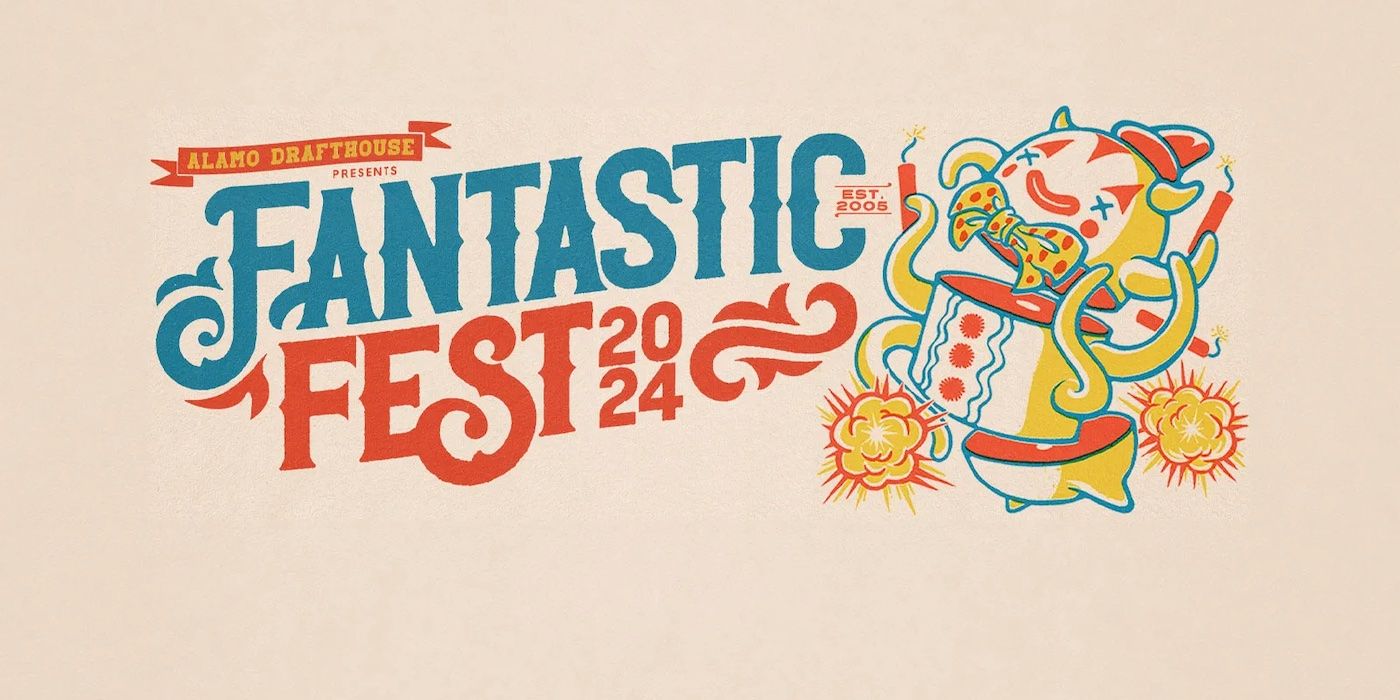 Image Via Fantastic Fest
Image Via Fantastic Fest PERRI NEMIROFF: I am here with the duo behind The Birthday , which is not only celebrating an anniversary screening, but you're also celebrating an upcoming release so many years after this movie was made, which is a really special thing to have that happen. Congratulations on both!
EUGENIO MIRA: Thank you. Thank you very much.
COREY FEDLMAN: Thank you very much.
Because we are at Fantastic Fest and I believe you've both been here before, can you tell me your single favorite thing about this festival, something that makes it stand out from all others?
FELDMAN: This is my first time and my first time at anything like this festival, but I'll let you answer the question. I’m Norman, by the way.
MIRA: I came here for the first time for the first edition in 2005.
FELDMAN: That's when we made our movie.
MIRA: Exactly. Months after the movie was shown.
FELDMAN: It's supposed to be in the ‘80s, but we're not really in the ‘80s.
MIRA: So it was 20 years ago we made the film, and in a matter of months, we could release the film, not theatrically, but we attended here, and we showed the movie. He wasn't here, I was. And from there I've been accumulating relationships with friends and other filmmakers. What I love about Fantastic Fest is that it's all about bonding, about moviegoers and filmmakers, and the fact that filmmakers started being moviegoers, and you can share that. I stumbled upon everyone at the Highball, and it's beautiful. I love this community.
Is there anything in particular you've seen at Fantastic Fest this year that inspired you creatively or gives you hope for the future of genre filmmaking?
MIRA: Well, I have to say, despite the fact that I knew pretty much everything about the production because it's a very good friend of mine and my wife, Nahikari [Ipiña], produced the film, I've seen Daniela Forever, Nacho Vigalando’s movie, that’s kind of an anchor in this film festival. I had a chance to see it on the big screen for the first time, completed in production, and I've been following all the steps. It was a hell of a big relief to see, “Oh, my god, look at that, how gorgeous that looks.” I knew all that they had to go through, and it's a very special movie. If you compare it to any other Nacho movie, it’s one-of-a-kind. He's encroaching in a new territory, more dramatic, more adult, and I've seen that people love it here. This is the best audience possible.
I always say that here at the Alamo, at Fantastic Fest, I call them active audiences. That is something that, unfortunately, we have to fight against in other realms because of thumb-scrolling and the lack of attention. But here you can see the people, the moment that the movie starts, they are locked in, and for film directors, there's nothing like it.
15:05
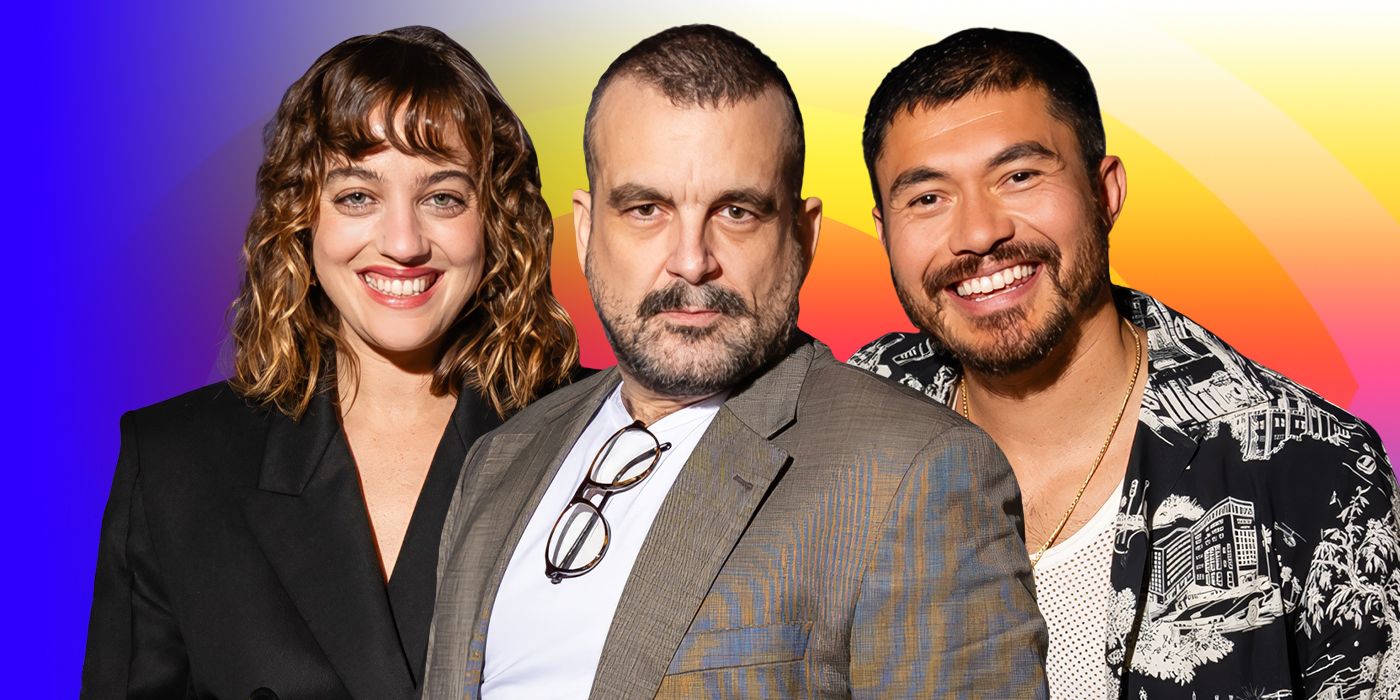
Related
'Daniela Forever' Is a Dreamscape Love Story With "Cinema Farts" – And That's a Good Thing!
Trust us, director Nacho Vigalondo makes this sound poetic in relation to his love story starring Henry Golding and Beatrice Grannò.
'The Birthday' Was a Eugenio Mira-cle
Getting into your movie specifically now, I was sent the featurette you made and there's a particular title card in it that very much caught my eye. It says, “Inexplicably, the film got into production and they convinced their childhood idol to star in it.” Many questions about that. First, can you run us through some of the key factors that made The Birthday possible, certain resources or people you met that made it the real deal?
MIRA: To make a long story short, the origin story of the project stems from my friendship with Mikel Alvariño, co-writer and co-creator of the script. We met at a film school in Madrid when I was 18 years old. I had spent three years convincing my parents that, "I'm not gonna go to college." There's not a program in Spain that gets you into film to learn everything. And since we met there, we had this connection and started to fantasize about the impossible things to do. The Birthday was one of those things, and inexplicably, as I said — it's a very loaded word — we got, as so many things in life, the opportunity to do it. But I wouldn't recommend anybody to go through that because it's like miracles, I have to say. The good and the bad thing about miracles is that they are not reproducible. They happen just once.
What facilitated this thing to happen, culminating on meeting this incredible partner from the very beginning through years of admiration... I don’t know how to handle this with Norman because, in a way, I think that you've been Norman for 20 years.
FELDMAN: Norman was born through your writing and your creation. You brought Norman to life, so here I am, and now I exist. I'm only here as a figment of his imagination. But now that his figment of his imagination is coming to reality, I guess here I am. So, you can ask me all the questions you want in that context, I suppose.
I'm doing some mental gymnastics here to rephrase my questions to suit that concept.
FELDMAN: I really appreciate that. Thank you very much. I’m sorry about that. I didn’t mean to throw it on you all of a sudden, but I'm kind of like a holographic character, like an avatar. Imagine I’m like an avatar for the actor who played me.
Norman, what is your absolute favorite quality of yourself, but then can you also tell me a new quality you found in yourself while making The Birthday ?
FELDMAN: Normally, I think I would say that I'm really good at spinning the dough on a pizza. They taught me how to do it the old-fashioned way, even though it’s not really New York. It's really from a small town called Brooklyn, and it's in Massachusetts, but it's not the actual Brooklyn. Anyway, I spent a lot of time in the pizzeria doing that, and I got pretty good at that. But I think the thing that came from all of this is perseverance. I really learned that I had this passion deep inside of me to be able to really speak my mind. Before this, I was very stifled. I couldn't speak my mind. I was very shy. I wouldn't have even been able to hold this microphone. You know.
MIRA: It’s true. He’s a new Norman.
FELDMAN: When you first met me, I was very timid. I was very shy. I couldn't stand here and stand up for myself or speak my mind. But now I feel very comfortable saying who I am and what I am, and what I'm about. This is a love story. It all started with a love story about me loving my girlfriend who I would do anything for. I'm very indebted, very passionate, a very loyal person when it comes to a girlfriend, and I would have done anything for her. But then I found out that there were some things I didn't know about her family, and it was a little weird and so the whole night got out of control, and that's what the movie's about.
That's an understatement. Here's a follow-up question for you. Is there any pizza on this planet that is better than New York pizza?
FELDMAN: No! Absolutely not. You know, it's funny you say that because we used to get this question all the time. People would come in, and they'd say, “Is it really New York-style pizza?” I'd say, “Yes, it is. It's New York-style pizza, but it's not actual New York pizza.” And they’d say, “Oh, do you ship the water in and all this kind of stuff?” And I'm like, “No, we can't do that. That's a myth.” It's a myth, by the way.
MIRA: So never go to Baltimore if you wanna have a true New York pizza.
FELDMAN: Yeah, if you want real New York pizza, just go to New York. It's so much easier. But that said, for Massachusetts, that pizzeria I used to work at was really the best. They were great.
MIRA: Shout out to that pizzeria.
FELDMAN: It’s called Gino’s, by the way. We never mentioned names.
Learning to Navigate the Consequences of Expressing Yourself
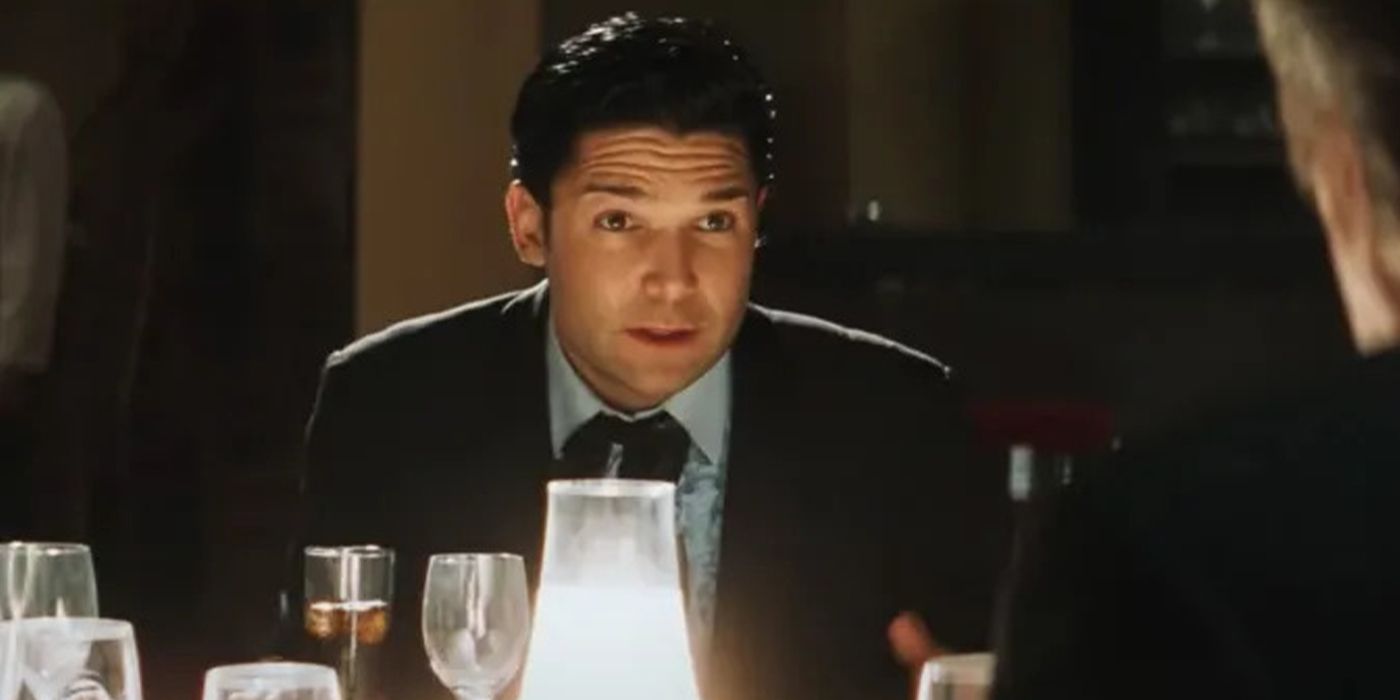 Image via Drafthouse Films
Image via Drafthouse Films To take a cue from Norman here and how much he evolved as a person through the making of this movie, I'll toss a similar question your way, Eugenio. What is a new tool in your directing tool kit that you know you gained from making The Birthday that you were able to apply to future projects?
FELDMAN: That's a great question.
MIRA: That is a great question. Actually, I will say, I had a chance to make this film when I was 26. I had just turned 27 here at Fantastic Fest. I was born on the 23, so it was my birthday with The Birthday.
FELDMAN: Happy birthday!
MIRA: Thank you, Norman.
FELDMAN: I forgot! Oh my god, I feel so terrible. We didn’t even have a cake. We didn’t do anything. That's true. I feel so bad. I'm sorry.
MIRA: No, no, no, it's all good. It’s all good. I’m fine!
FELDMAN: We have had a crazy 24 hours, but I feel really bad now.
What a way to celebrate!
FELDMAN: [Singing] Happy birthday to you, happy birthday to you — come on, you gotta sing with me — happy birthday, dear Eugenio! Happy birthday to you. You got me choking up on my own song. You guys are making me laugh in the middle of my song. I can’t finish it! And with that, we present to you his movie, The Birthday. Imagine that.
MIRA: He’s in it.
FELDMAN: I'm in it, too.
MIRA: So, answering your question, having the chance to do something as crazy and as pure and unadulterated gives you a lot of perspective on the difference between having the chance to express yourself and the consequences in a career. So I had to go through navigating that, like the Faustian quality of being that young, doing this thing, and having to wait 20 years until we had a proper distribution. For example, in the US as a kid, I was raised as a European kid, a Spanish kid, who was being raised by American cinema. It was a big deal to have your childhood icon as a protagonist and the fact that we had the chance to discuss his experience in the medium. That's unparalleled. From there, I have to say that obviously I've learned a lot things that you're not gonna do the same way, things that you're gonna do in a different way. It’s the best film school ever, your first film. So, yeah, I've learned a lot.
Why Did It Take 20 Years for 'The Birthday' to Release in Theaters?
"It's a movie that is designed to demand attention."
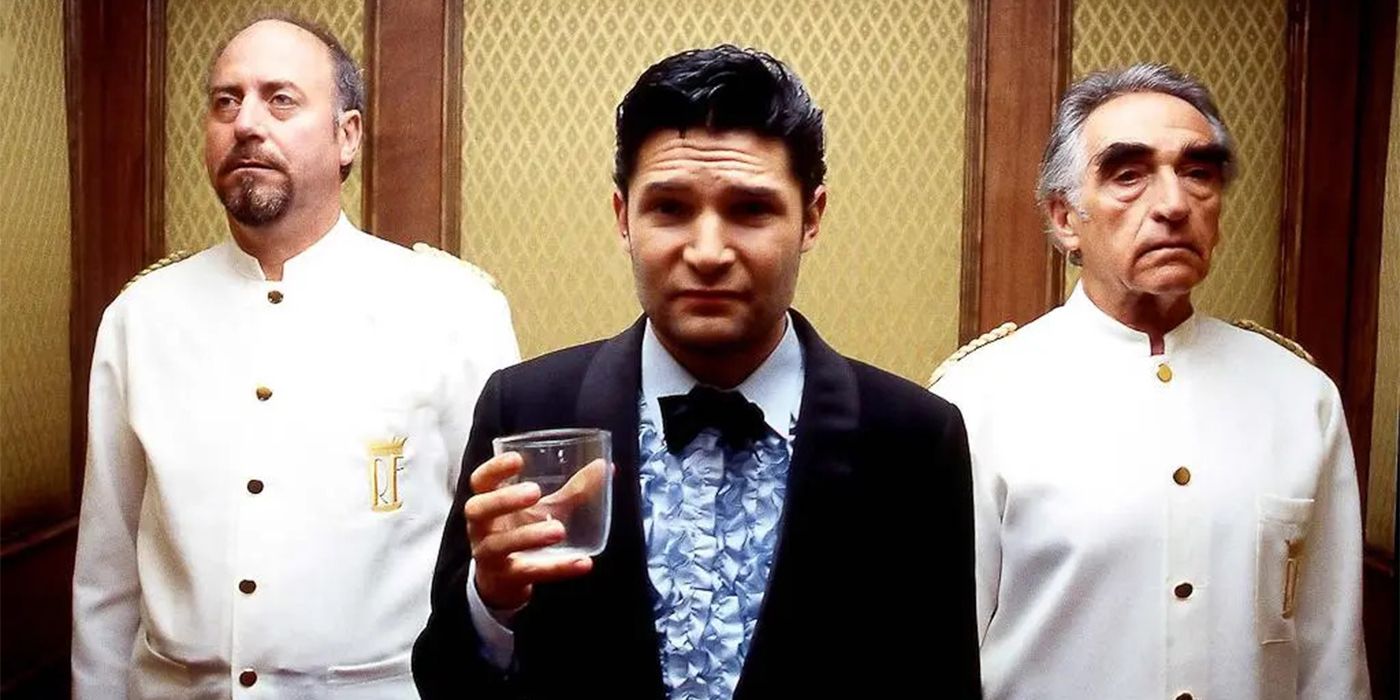 Image via Drafthouse Films
Image via Drafthouse Films So you see it through to fruition. One thing that I've been especially curious about is, after it went on its initial film festival run, what happened? Why did it disappear?
FELDMAN: That's a good question. What I was just gonna say was it was like we had, it was kind of like sex, right? Sex that you didn't finish. It was like we had so much fun the whole time making this. Making it, it was fun, it was fun, it was fun, and then right when it was supposed to be the big finish, there was nothing. There was nothing. We had the film festivals, we came here — I didn't come, but he was here — and it was very praised. People loved the work. In Sitges [International Film Festival], people loved the work. In Luxembourg, I think there was an award for my story, and then what? Nothing happened.
MIRA: Well, not to get into the details, let's leave it at the fact that it was an independent production.
FELDMAN: The powers that be.
MIRA: Well, not the powers that be. I think that it is as simple as the fact that we were all, the people involved, not experienced in certain things but very capable of doing others. And when it comes to distributing a film, not knowing that you have to pre-sell it before and stuff like that, that, of course, is gonna devaluate the film. When there are some offers, and you wait for a better offer… For the record, I didn't produce the film, so I'm talking about what happened beyond my reach.
FELDMAN: We were co-producers of the film but not the executive producers of the film.
MIRA: We were passive co-producers. [Laughs]
FELDMAN: It wasn't our job to make the decision on who got to do what as far as distribution. So we just said, “Hey, we wanna make sure it's in theaters because this movie needs to be seen in theaters.” That was one thing that we cared about. But unfortunately, I don't think that they had the right offer to get it into theaters. So, I think we all agreed that we didn't wanna do it unless it was gonna be in theaters, and now it's in theaters! It took 20 years, but we got there.
MIRA: The fact that in 2024, in a world, as I said before, where the people, more often than not, are more than comfortable with sticking their eyes on their iPhones or playing with streaming platforms at home and pausing, or even worse letting it go…
FELDMAN: That’s not this movie.
MIRA: It's a movie that is designed to demand attention. It's like playing a vinyl record. Eventually, you're gonna have to stand up and go to the other face of the vinyl. In this, you have two halves, as well. You don't have to change anything but you have to be there and allow the film to cook you into another iteration of yourself.
FELDMAN: It's shot in 70mm anamorphic widescreen, so for anybody who understands the art of cinema, 70mm anamorphic widescreen is very rare these days. You don't see it used very much anymore. Back in the old days, movies like Star Wars or The Godfather, those movies were made for that, and this was made for that. That's the point is that it would be such a shame if people couldn't see it the way it was meant to be seen. So we're both very, very grateful to be here, and we're both very, very grateful that after 20 years of waiting for this love, I mean, we put so much love and passion into this project. Both of us did, especially him, obviously, because it's his baby. He wrote it, he created it, he directed it — it's all him. It's his heart. Obviously, we're related. You can tell there's a little bit of a similarity.
So the point is, as family, we both were very excited about this. His dad was excited about it. It was really a family production. His dad was excited about it. The whole family was excited about it. Everybody was rooting for him. So when it didn't come out, it was really a big letdown, and the fact that we finally got it out now and it's gonna be seen the way it's meant to be seen with the big widescreen, hopefully, fingers crossed, it gets more theaters. We're hoping that it does very well at the box office. If it does, who knows? But even if it ends up on Blu-ray in a month, it doesn't matter. I mean, it matters, but I'm just saying it wouldn't be as bad because at least people got to see it somewhere in the theaters.
MIRA: I couldn’t be more grateful. I'm still pinching myself. On top of that, how surreal everything has been…
FELDMAN: Define surreal.
MIRA: Surreal means when something is so good or so magic-like that your body generates this kind of shield, believing, “Oh, this can’t be true! This must be some kind of deceiving system to harm me in another way.” So you get protective just because it's so above this valley of tears we call consensus reality every single day when you read the news. How are you even allowed to feel this great? It's like there's a part of you that has this cognitive dissonance, saying, “It can’t be real. It can’t be real!” But it's real.
You're gonna feel how real it is soon!
FELDMAN: This is odd. I say it to Eugenio, but it’s his cousin “odd.”
"There Was a Magic" on the Set of 'The Birthday'
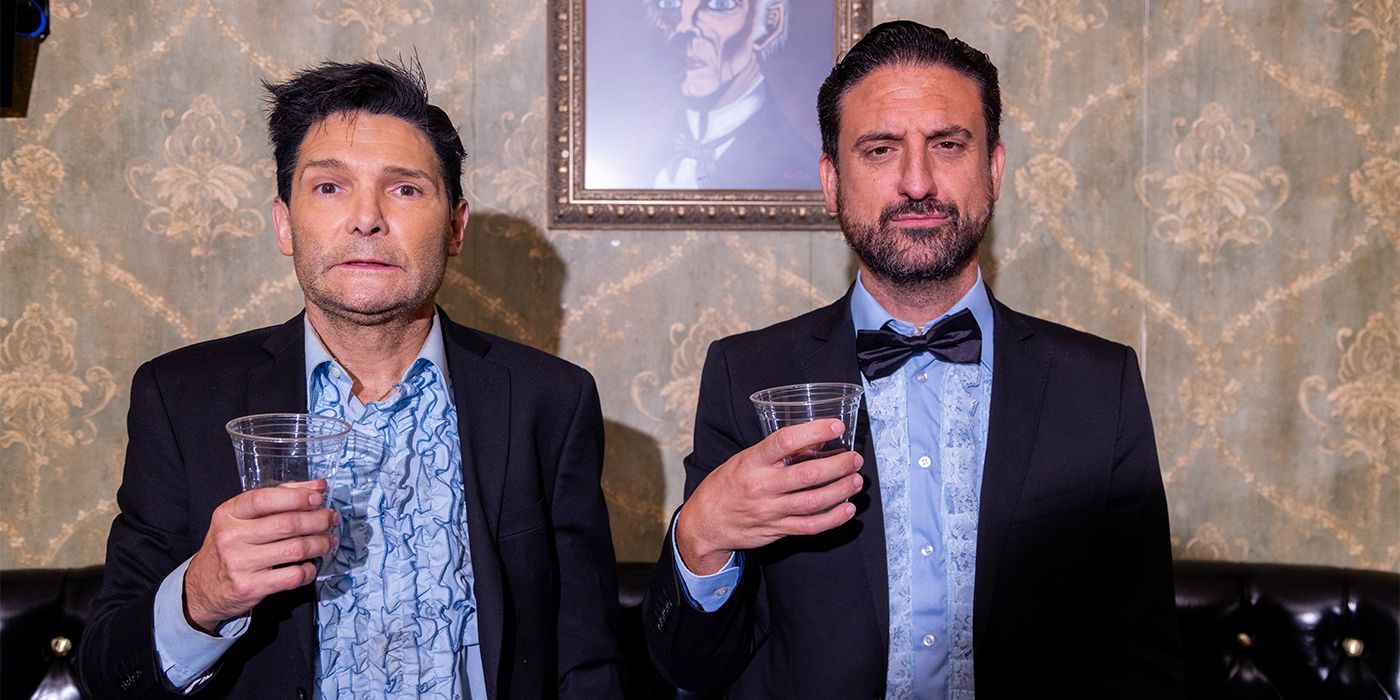 Image via Fantastic Fest
Image via Fantastic Fest This kind of builds on what you two were just expressing, and it also happens to be the question that I've been ending all of these Fantastic Fest interviews on. The first interview we did at the festival this year was for The Rule of Jenny Pen. It's the movie that stars John Lithgow and Geoffrey Rush, and their director, James [Ashcroft], was saying he couldn't believe what it was like watching these two acting icons take such joy and pride in their work. So, for the two of you, while making The Birthday , what was the single moment on set that brought you the most joy?
MIRA: Again, I have to underline this, I was 26, and I’d just made a short film before that caught the attention of this production company that I’d never met before. We were over-enthusiastic about making our first film together, and the bucket list, check after check after check after check, it happened. We had constraints with the budget, obviously, but at the same time, it was another era in Spain, building sets in this place, and it was this haunted abandoned hospital. It was very cheap, but some of the privileges of shooting off-Hollywood applied here and made possible the combination of bringing something that is a load of kind of icon into that environment where we could control everything and play together.
Every single day there was this feeling of achievement that was shared with the audience. It wasn't me being mean or frustrated because we didn't get what I wanted. No, we had all these beautiful shots. Every single shot was like a dance, a choreography. It was really well laid out, the professionals, the crew, and everybody was in the same line, in the same direction, and it was a motive of celebration. It was like, “We are making this film, and we're getting through the whole thing.” That's something that nobody can take from us. We enjoyed doing that.
FELDMAN: So similarly, I was about the same age, around 26 years old, and I'd never been on a film set either. So for me, it was a big learning experience, as well, but I was a big student of film and I watched a lot of movies about how movies are made. I can tell you that there was a magic on the set that you don't get all the time because a lot of times, from what I know, it feels very stiff. It feels like you're just kind of beating a dead horse, doing the same thing over and over and over. But with this, it was like a tapestry that was created. Everything he did ahead of time, he put so much time and energy into the blueprint of creating the imagery, the way that it was gonna be focused with the cameras and the lighting, and where the actors would be in the background of what's happening.
It was like a big giant play. So imagine if you're watching a big play on Broadway and they already knew what the best position to put the people in their seats would be to see the right angle for each moment of that play. That's the way I feel like it was constructed in his mind. He really visualized every moment of it ahead of time, but yet still left some room for improvisation in the moment, so if things went a little different way one take, or a different way another take, if it felt right, then he would roll with it because you never know. Real-life experience, you gotta be able to pull from that experience in a moment, otherwise, it's not honest. So, we had to keep it honest.
I saw that a little bit in that featurette. I was busy pausing on the storyboards and trying to analyze every little bit. I appreciate that attention to detail.
MIRA: Thank you very much.
I know 20 years is a long time to wait for this kind of release, but you have built quite the special fan base that not a lot of films do over the years, and now you're gonna get the opportunity to celebrate it properly.
FELDMAN: We’re very grateful for you guys.
For everybody out there, go see The Birthday in theaters with a packed house, as it should be seen. Thank you both so much for being here and sharing some of your experience with us.
MIRA: Thank you very much.
FELDMAN: Thank you so much. We appreciate this.
MIRA: It means a lot to us
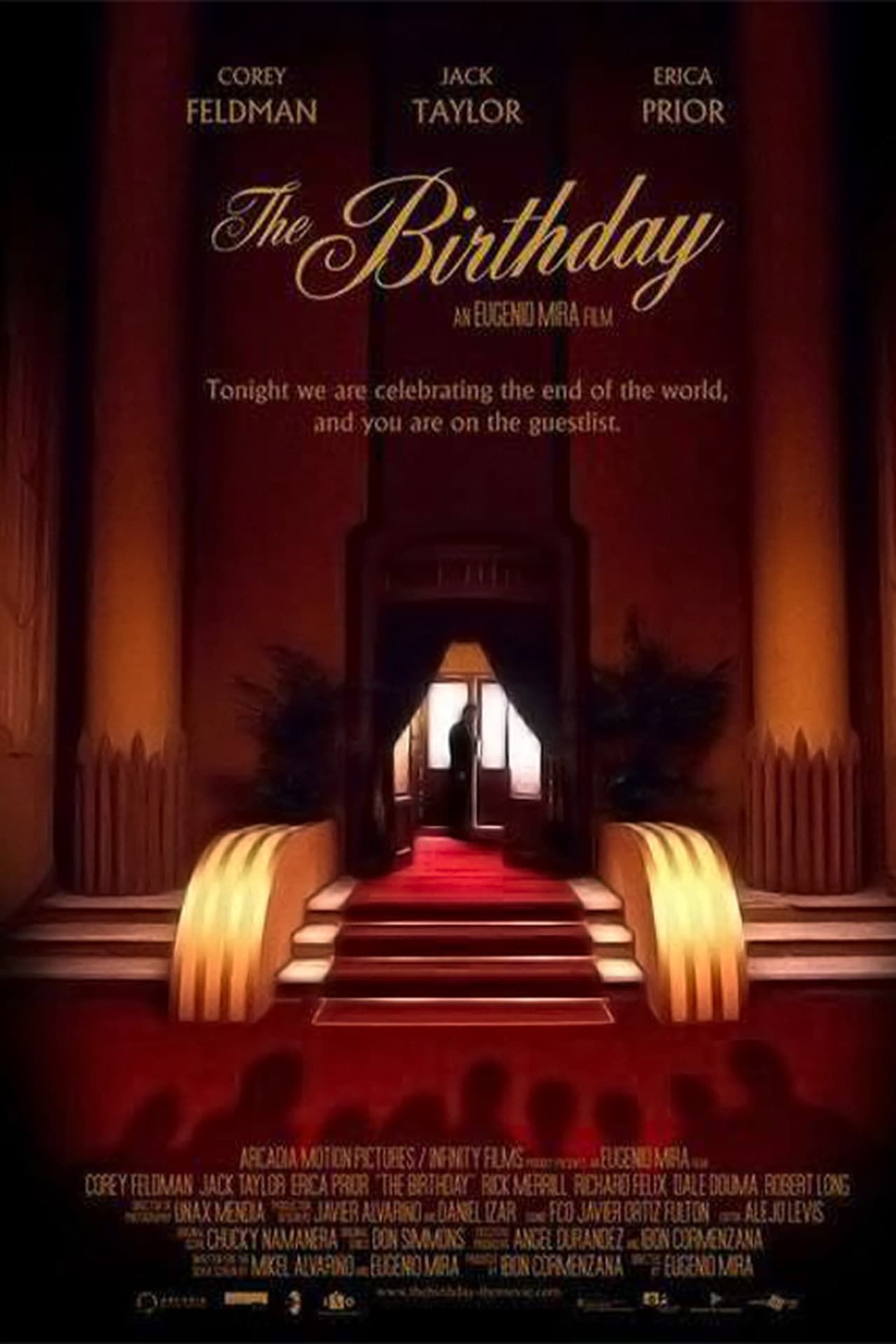
Norman, a young man very much in love with his girlfriend, attends her father's birthday party, held in a hotel where a sect happens to be preparing for the birth of the god it worships.
Director Eugenio Mira
Runtime 100 Minutes
Writers Mikel Alvariño , Eugenio Mira
The Birthday is now available to watch on demand.

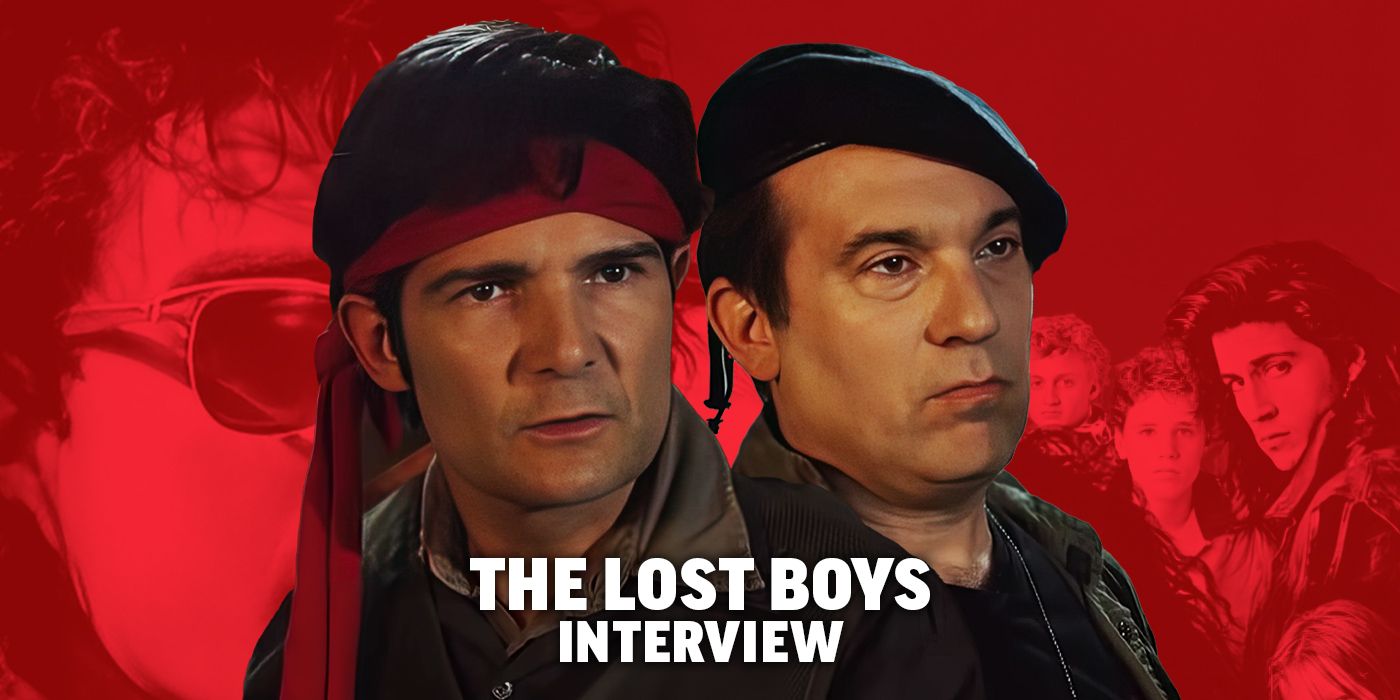
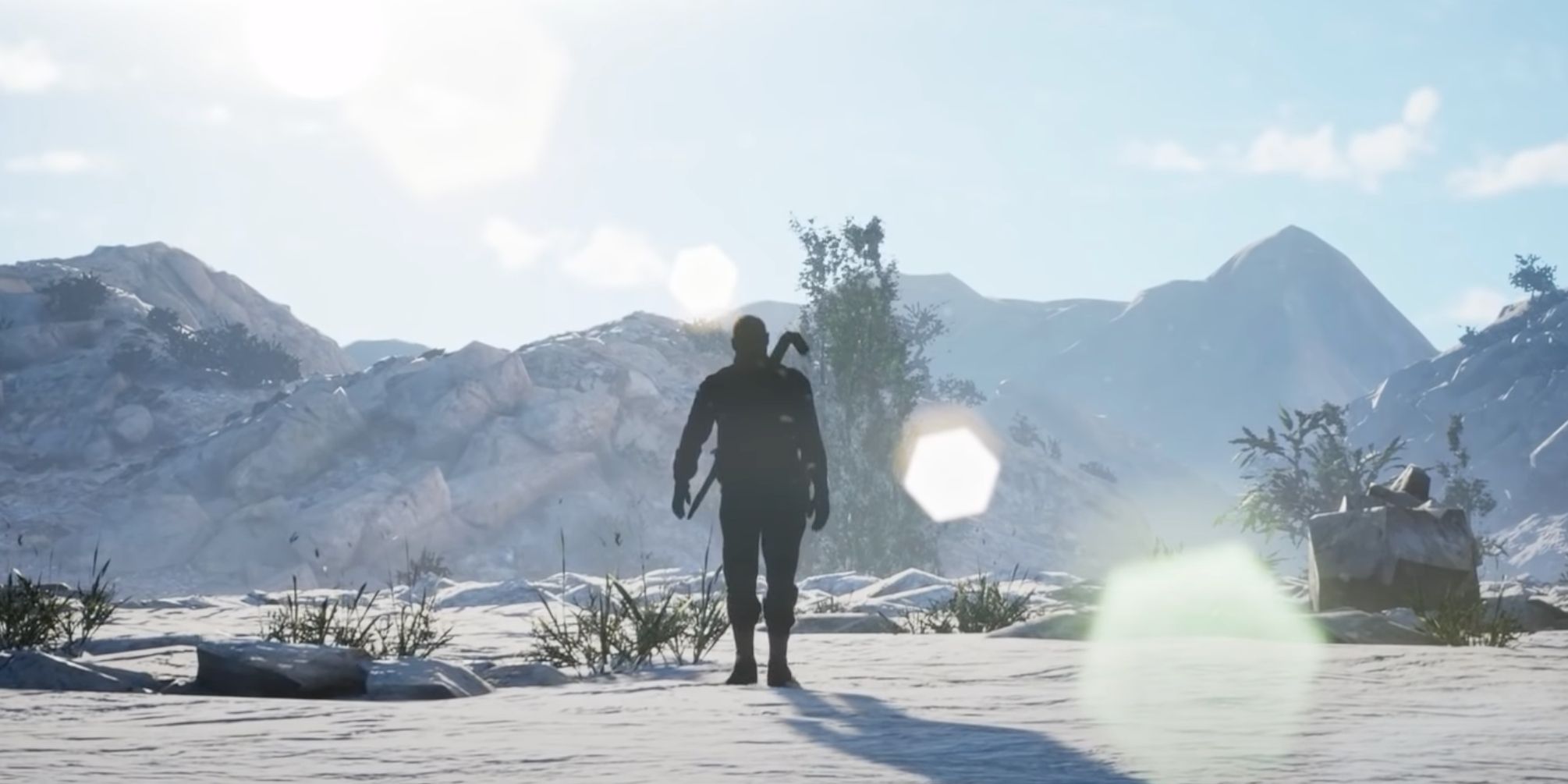

:quality(85):upscale()/2023/09/21/802/n/1922729/d9a11ce9650c8850437280.00070284_.jpg)

:quality(85):upscale()/2024/10/29/957/n/1922441/c62aba6367215ab0493352.74567072_.jpg)
:quality(85):upscale()/2024/10/30/711/n/1922441/c62313206722590ade53c4.47456265_.jpg)

 English (US) ·
English (US) ·